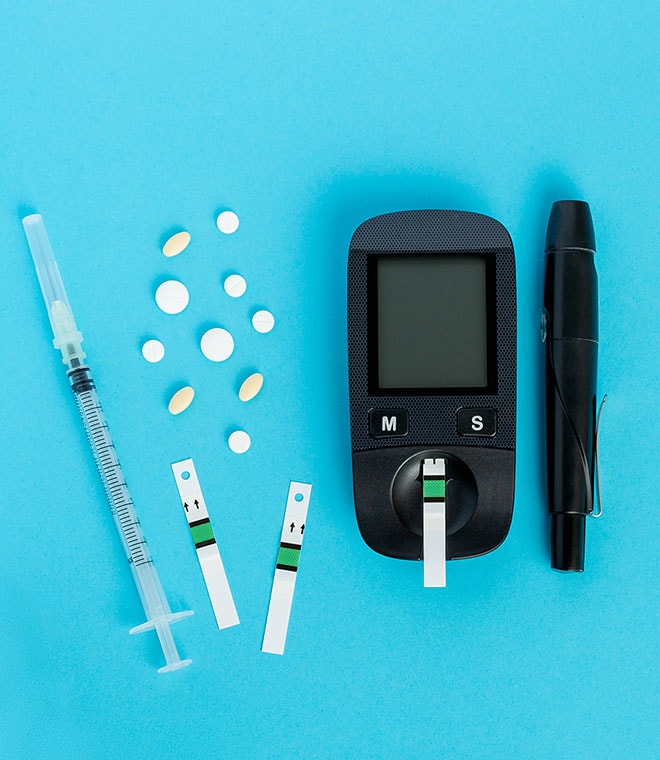Health
Smart strategies for weight loss with type 2 diabetes
By Jenilee Matz, MPH Nov 06, 2023 • 6 min
Having diabetes means taking special care to keep your blood sugar levels under control. Over time, elevated blood sugar levels can lead to dangerous complications. However, following your treatment plan as directed by your healthcare provider can help reduce your risk of diabetes-related health problems. Managing diabetes well involves adjusting your lifestyle, which often includes losing weight. Learn why a healthy weight is important for people with diabetes and how you can achieve your weight loss goals.
How a healthy weight can help you
For people with type 2 diabetes, reaching and maintaining a healthy weight can improve your blood sugar control and help you manage diabetes better. If you take medicine, losing weight may reduce how much insulin or other diabetes medications you need. In some cases, weight loss may even restore your blood sugar to a normal level. Losing weight can also help lower your risk of many diabetes-related complications, including heart issues, kidney disease and nerve problems. In addition, achieving a healthy weight can enhance your energy levels, ease stress on your hips and knees and boost your self-confidence.
Set realistic goals
Chances are you've tried to lose weight before. Even if you've fallen short of your weight loss goals in the past, know that you can lose weight for good. Eating a nutritious diet and getting regular exercise are the foundations of a sound weight loss plan, but know that you also need another component: realistic goals. Setting achievable goals can help you lose weight and keep it off in the long run. Keep the following in mind when goal setting:
- Weight loss takes time. "Slow and steady wins the race" is true for weight loss. Resist the urge to try to drop weight as quickly as possible. According to the Centers for Disease Control and Prevention, adults who lose weight slowly and steadily, about 1–2 pounds per week, are more successful in keeping the weight off. If you need to lose 50 pounds, for example, give yourself six months to one year to meet that goal.
- Even a modest weight loss can help. If you have a significant amount of weight to lose, take heart in knowing that you don't have to meet your weight loss goal before you start gaining health benefits. Losing just 5% to 10% of your total body weight, which is 10–20 pounds if you weigh 200 pounds, can help improve your blood sugar, blood pressure and cholesterol levels.
- Fad diets don't work. Pills, diets that shun entire food groups and other weight loss plans that seem too good to be true probably are. There are no shortcuts when it comes to weight loss, and restrictive diets are unlikely to help you lose and keep off weight in the long run. Achieving lasting weight loss involves long-term changes to your eating and exercise habits.
Create a plan
The basics of weight loss include burning more calories than you consume. Keeping portion sizes in check and choosing nutrient-dense foods, including fruits, vegetables, whole grains, lean sources of protein and low-fat and nonfat dairy products, over foods high in saturated and trans fats, added sugars and sodium (salt) can help you meet your goals. Being more physically active throughout the day is important for burning calories and achieving weight loss. Aim for 150 minutes of moderate-intensity exercise, such as brisk walking, jogging or swimming, each week. You can break that up however you need to, whether it be five 30-minute workouts or shorter, more frequent sessions. Any time you spend moving counts toward your exercise goal.
Note that small changes all add up. You may not have to make sweeping lifestyle changes to lose weight. Maybe you start by walking during lunch three days a week and trading your daily high-sugar latte for coffee with low-fat milk. Or perhaps you take up dance or water aerobics classes and start paying closer attention to portion control. Be specific with your plans, track your progress and reward yourself when you reach milestones.
Losing weight, and keeping it off, is no easy feat. Know that you don't have to go at it alone. Your healthcare provider and other professionals, such as a registered dietitian and personal trainer, can help guide your weight loss efforts. With the right goals, plan, support and mindset, know that lasting weight loss is achievable. Stick with your plan and remember that losing even a modest amount of weight can improve your health and blood sugar control.
Clinically reviewed and updated November 2023.
Sources:
- https://www.diabetes.org/healthy-living/weight-loss/getting-started.
- https://www.niddk.nih.gov/health-information/diabetes/overview/diet-eating-physical-activity.
- https://diabetes.org/health-wellness/weight-management
- https://www.cdc.gov/healthyweight/losing_weight/index.html.
- https://newsnetwork.mayoclinic.org/discussion/losing-weight-can-have-big-impact-on-those-with-diabetes/.



